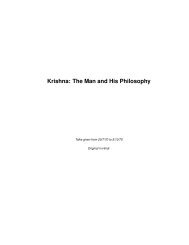The Empty Boat - Osho.pdf - Oshorajneesh.com
The Empty Boat - Osho.pdf - Oshorajneesh.com
The Empty Boat - Osho.pdf - Oshorajneesh.com
You also want an ePaper? Increase the reach of your titles
YUMPU automatically turns print PDFs into web optimized ePapers that Google loves.
CHAPTER 7. THREE FRIENDS<br />
Friends can discuss. Why? You can love a person, you cannot love a philosophy. Philosophers<br />
cannot be friends. You can be either their disciple or their enemy but you cannot be their friend.<br />
Either you are convinced by them or not convinced, either you follow them or don’t follow them, but<br />
you cannot be friends. A friendship is possible only between two empty boats. <strong>The</strong>n you are open<br />
to the other, inviting to the other, then you are constantly an invitation, <strong>com</strong>e to me, enter me, be<br />
with me.<br />
You can throw away theories and philosophies but you cannot throw away friendship. And when you<br />
are in friendship a dialogue be<strong>com</strong>es possible. In dialogue you listen, and if you have to speak, you<br />
speak not to contradict the other, you speak just to seek, to inquire. You speak, not with a conclusion<br />
already reached, but with an inquiry, an ongoing inquiry. You are not trying to prove something: you<br />
speak from innocence, not from philosophy. Philosophy is never innocent, it is always cunning, it is<br />
a device of the mind.<br />
Three friends were discussing life – because between friends a dialogue is possible. So in the East<br />
it has been the tradition that unless you find friendship, love, reverence, trust, no inquiry is possible.<br />
If you go to a master and your boat is filled with your ideas, there can be no contact, there can be<br />
no dialogue. First you have to be empty so that friendship be<strong>com</strong>es possible, so that you can look<br />
without any ideas floating across your eyes, so that you can look without conclusions. And whenever<br />
you can look without conclusions, your perspective is vast, it is not confined.<br />
A Hindu can read <strong>The</strong> Bible, but he never understands it. Really, he never reads it, he cannot listen<br />
to it. A Christian can read the Gita, but he remains the outsider. He never penetrates its innermost<br />
being, he never reaches the inner realm, he moves round and round it. He already knows that only<br />
Christ is true, he already knows that only through Christ is salvation; he already knows that only<br />
Christ is the son of God. How can he listen to Krishna? Only Christ is truth. Krishna is bound to<br />
be untrue, at the most, a beautiful untruth, but never true. Or if he concedes much, then he will say,<br />
approximately true.<br />
But what do you mean when you say approximately true? It is untrue! Truth is either there or not.<br />
Nothing can be approximately true. Truth is, or truth is not. It is always total. You cannot divide it.<br />
You cannot say it is true to some degree. No, truth knows no degree. Either it is or it is not.<br />
So when the mind contains the conclusion that Christ is the only truth, then it is impossible to listen<br />
to Krishna. Even if you <strong>com</strong>e across him on the path you will not be able to listen to him. Even if you<br />
meet Buddha you will not meet him.<br />
And the whole world is filled with conclusions. Someone is a Chris-tian, someone is a Hindu,<br />
someone is a Jaina, someone is a Buddhist – that is why truth is missing! A religious person cannot<br />
be a Christian, a Hindu, or a Buddhist, a religious person can only be a sincere inquirer. He inquires<br />
and he remains open without any conclusions. His boat is empty.<br />
Three friends discussing life.... Only friends can discuss because then it be<strong>com</strong>es a dialogue, then<br />
the relationship is of I and thou. When you are debating, the relationship is of I and it. <strong>The</strong> other is<br />
a thing to be converted, convinced, the other is not a thou; the other has no significance, the other<br />
is just a number.<br />
<strong>The</strong> <strong>Empty</strong> <strong>Boat</strong> 123 <strong>Osho</strong>
















